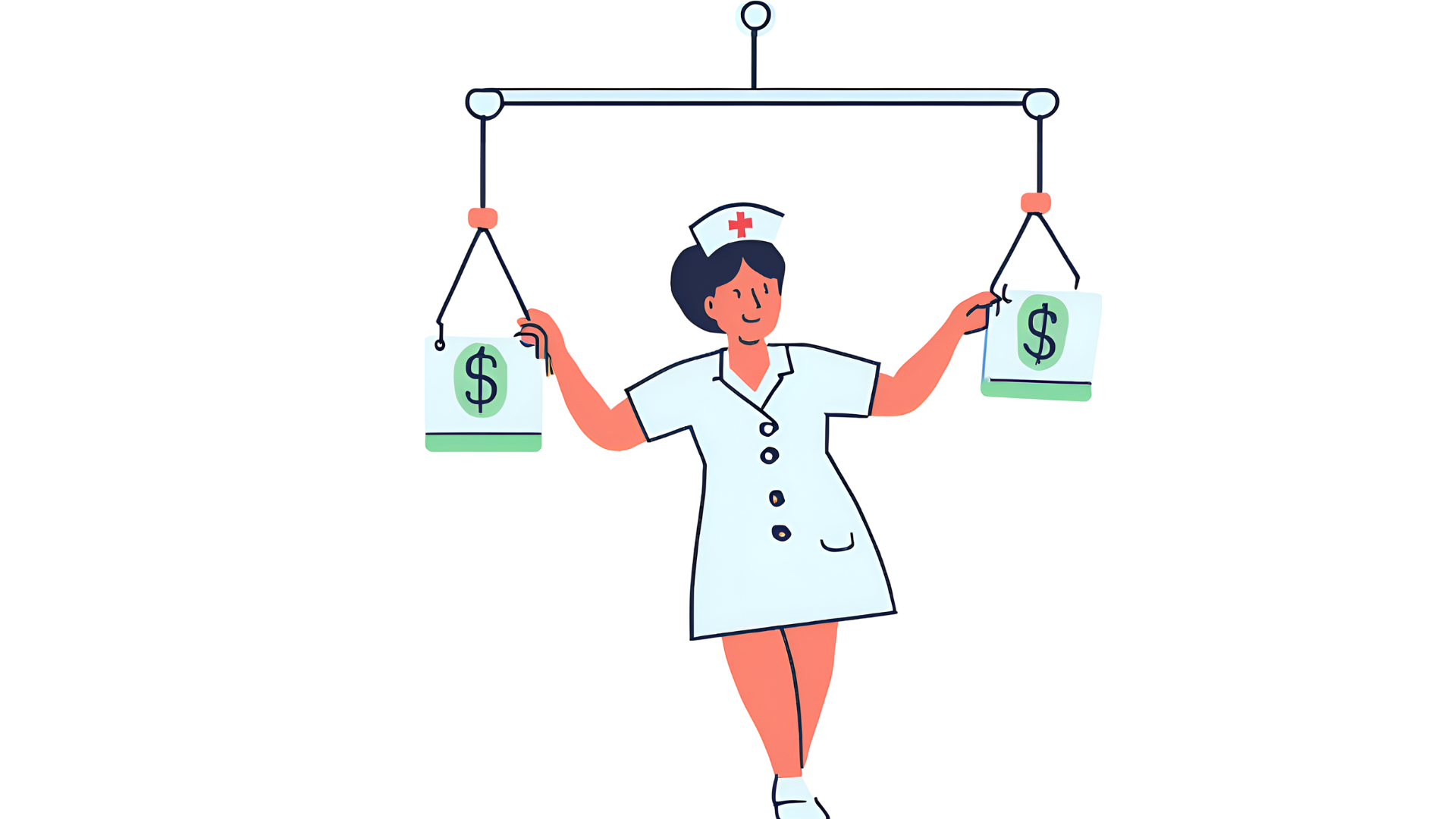How to Boost Your Savings for Nurses
We’ve all been there—working long, exhausting shifts while trying to keep up with your expenses. When you’re juggling rent, groceries, and bills, savings money feels pretty much impossible. We’re trying to save as much money as we can. But guess what? As a nurse, it’s totally possible to cut costs and increase your savings at home without feeling like you’re giving up the things you love.
In this post I’m going to break down how to save money as a nurse in 3 easy ways. You don’t need a hardcore budget cut, just a few adjustments here and there to boost your savings.
1. Housing

Housing is most likely one of your biggest expenses as a nurse. A good rule of thumb is that your housing shouldn’t cost more than 28% of your income. But in a more spendy area, that can seem impossible. Especially given the high demand for housing and rising prices. But don’t stress! Here are some ways you can cuts costs at home to make it more manageable:.
Rent out a room:
If you’ve got extra space consider renting it out for extra income. This is not only a great way to make more money without working extra shifts, but it also opens up opportunities for building community and connection with new people. Platforms like Airbnb, Roommates.com, or even local classifieds can help you find reliable renters, providing you with supplemental income that can ease your financial burden.
Downsize or move:
Another idea is to downsize or move. Sometimes, it’s more cost-effective to move to a cheaper neighborhood or to downsize your home altogether. This could save you hundreds each month, freeing up cash for savings or other expenses. While moving can be a difficult decision, it may lead to a better quality of life and more financial freedom, allowing you to put funds towards other important areas, such as student loans, retirement savings, or even travel.
Negotiate your rent:
I get it—negotiating can be uncomfortable. But if you’ve been a solid tenant and have consistently paid your rent on time, don’t hesitate to ask your landlord if they might be open to discussing a rent reduction or more favorable lease terms. The worst they can say is no. A simple convo could lead to a lowered monthly rate, which translates directly into more money in your pocket that can be redirected to other goals.
Utilizing Financial Assistance Programs:
Many communities offer rental assistance for healthcare workers or first responders, which can provide a substantial financial help. It’s worth it to research what options might be available in your area, since these programs can sometimes cover a significant part of housing costs.
Housing is a quick way to increase savings for healthcare workers, especially when trying to manage a tight budget.
2. Cars/Driving

Ah, the 4-wheeled money pit. As a nurses, most of us rely on our car to get to and from work. While having a vehicle is essential for many, they can easily chew through a large chunk of your income due to different costs associated with ownership, including gas, insurance, maintenance, and repairs. However, they don’t have to be a financial thorn in your side. Here are some tips to help you keep more of that hard-earned paycheck:
Use alternative transportation:
Have you considered walking, biking, or using public transportation to get to work? Even cutting down on driving just a few days a week can fatten your wallet. Not only does this approach save you money on gas and wear and tear on your vehicle, but it can also promote a healthier lifestyle. Walking or biking provides great exercise, while public transit can offer a chance to relax, read, or catch up on podcasts during your commute.
Choose a reliable vehicle over a luxury one:
When you’re ready to buy a car, it’s important to focus on the long-term benefits of your purchase. Opting for a reliable, well-maintained vehicle rather than a luxury model can save you a substantial amount of money in the long run. Reliable cars tend to have better fuel efficiency and lower maintenance costs, while luxury vehicles can come with expensive repairs and high insurance premiums. Researching dependable brands known for longevity and low ownership costs will pay off by avoiding frequent trips to the mechanic.
Carpool with coworkers:
If you live near some coworkers who are on the same shift as you, consider carpooling. This not only decreases gas and parking costs but also gives social aspect to your commute. Sharing rides and expenses means less strain on each person’s budget, and you may even find that commuting with colleagues helps develop friendships and reduces stress. Some employers even incentivize carpooling with preferred parking spots, rewards programs, or free parking!
By decreasing car-related expenses, you’ll be able to save money as a nurse without cutting into your budget.
3. Food

If you’re not careful, groceries can easily become one of your biggest monthly bills. It’s all too easy to watch your food budget circle the drain. If you’re tired of feeling like your grocery expenses are spiraling out of control, try these tips to cut costs at home on your grocery bill:
Meal plan:
Instead of wondering the aisles of the grocery stores aimlessly, a big part of reeling in your grocery costs is to plan your meals ahead of time. Try setting aside some time each week to brainstorm your meal plan. A good thing to keep in mind while doing this is to think of recipes with ingredients that you can use for multiple meals, decreasing your spending and food waste, it’s a double whammy. The key is to stick to your grocery list, by doing this you can avoid impulse buys and save hundreds of dollars every month.
Buy in bulk:
For starters I’m obsessed with Costco. So naturally my next tip is to cut down your grocery bill by buying items in bulk. Stock up on essentials like pasta, rice, canned goods, and other meal staples, which are great to have handy. You could even buy bulk meat and stick it in the freezer. Buying bulk lets you to take advantage of lower per-unit prices, helping you stretch your budget even further. This strategy works especially well for items with a long shelf life, and can also help you get ready for busy weeks when cooking might be more difficult. Just be sure to buy what you’ll realistically use to prevent any waste or overspending.
Use grocery apps for discounts:
These days, most stores have their own apps that offer specials or digital coupons. These apps usually give exclusive deals and discounts in addition to regular sales, letting you maximize your savings. Also, many of these apps have rewards programs where you can earn points for your purchases. Earned points can be redeemed for discounts or free products in the future, making every shopping trip even more rewarding. Don’t forget to check for cash-back offers on rebate apps that can give you more savings on your grocery bills.
With just a little bit of planning, you can reduce your grocery bill and increase your savings as a nurse. While still enjoying tasty meals.
Final Thoughts on Saving More
Saving money as a nurse doesn’t mean sacrificing the little things you love. Making a few intentional changes can have a big impact on your budget. By adjusting your housing, car, and grocery expenses, you’ll be able to cut costs and see those savings grow.
So why wait? Whether it’s renting out a room, carpooling with coworkers, or meal planning for the week, these small changes add up and can lead to major improvements in your finances.
Take control of your finances and start building your savings today—because every small step counts.
Related Posts:
- 4 Reasons to Ditch Your Drive to Work for Nurses
- 3 Reasons Why Nurses Splurge on Expensive Cars
- Why You Need an Emergency Savings Fund: 5 Essential Reasons for Nurses


Pingback: 3 Reasons Why Nurses Splurge on Expensive Cars | Greener Scrubs